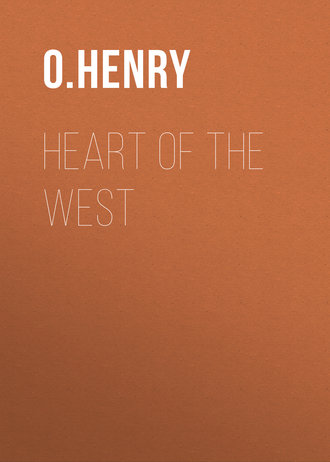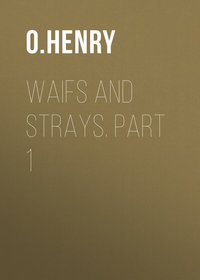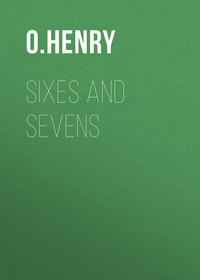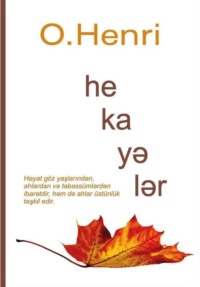 полная версия
полная версияHeart of the West
Sam, the cosmopolite, who called bartenders in San Antone by their first name, stood in the door. He was a better zoologist.
"Well, ain't that a Willie for your whiskers?" he commented. "Where'd you dig up the hobo, Ranse? Goin' to make an auditorium for inbreviates out of the ranch?"
"Say," said Curly, from whose panoplied breast all shafts of wit fell blunted. "Any of you kiddin' guys got a drink on you? Have your fun. Say, I've been hittin' the stuff till I don't know straight up."
He turned to Ranse. "Say, you shanghaied me on your d-d old prairie schooner-did I tell you to drive me to a farm? I want a drink. I'm goin' all to little pieces. What's doin'?"
Ranse saw that the tramp's nerves were racking him. He despatched one of the Mexican boys to the ranch-house for a glass of whisky. Curly gulped it down; and into his eyes came a brief, grateful glow-as human as the expression in the eye of a faithful setter dog.
"Thanky, boss," he said, quietly.
"You're thirty miles from a railroad, and forty miles from a saloon," said Ranse.
Curly fell back weakly against the steps.
"Since you are here," continued the ranchman, "come along with me. We can't turn you out on the prairie. A rabbit might tear you to pieces."
He conducted Curly to a large shed where the ranch vehicles were kept. There he spread out a canvas cot and brought blankets.
"I don't suppose you can sleep," said Ranse, "since you've been pounding your ear for twenty-four hours. But you can camp here till morning. I'll have Pedro fetch you up some grub."
"Sleep!" said Curly. "I can sleep a week. Say, sport, have you got a coffin nail on you?"
*****Fifty miles had Ransom Truesdell driven that day. And yet this is what he did.
Old "Kiowa" Truesdell sat in his great wicker chair reading by the light of an immense oil lamp. Ranse laid a bundle of newspapers fresh from town at his elbow.
"Back, Ranse?" said the old man, looking up.
"Son," old "Kiowa" continued, "I've been thinking all day about a certain matter that we have talked about. I want you to tell me again. I've lived for you. I've fought wolves and Indians and worse white men to protect you. You never had any mother that you can remember. I've taught you to shoot straight, ride hard, and live clean. Later on I've worked to pile up dollars that'll be yours. You'll be a rich man, Ranse, when my chunk goes out. I've made you. I've licked you into shape like a leopard cat licks its cubs. You don't belong to yourself – you've got to be a Truesdell first. Now, is there to be any more nonsense about this Curtis girl?"
"I'll tell you once more," said Ranse, slowly. "As I am a Truesdell and as you are my father, I'll never marry a Curtis."
"Good boy," said old "Kiowa." "You'd better go get some supper."
Ranse went to the kitchen at the rear of the house. Pedro, the Mexican cook, sprang up to bring the food he was keeping warm in the stove.
"Just a cup of coffee, Pedro," he said, and drank it standing. And then:
"There's a tramp on a cot in the wagon-shed. Take him something to eat. Better make it enough for two."
Ranse walked out toward the /jacals/. A boy came running.
"Manuel, can you catch Vaminos, in the little pasture, for me?"
"Why not, senor? I saw him near the /puerta/ but two hours past. He bears a drag-rope."
"Get him and saddle him as quick as you can."
"/Prontito, senor/."
Soon, mounted on Vaminos, Ranse leaned in the saddle, pressed with his knees, and galloped eastward past the store, where sat Sam trying his guitar in the moonlight.
Vaminos shall have a word-Vaminos the good dun horse. The Mexicans, who have a hundred names for the colours of a horse, called him /gruyo/. He was a mouse-coloured, slate-coloured, flea-bitten roan- dun, if you can conceive it. Down his back from his mane to his tail went a line of black. He would live forever; and surveyors have not laid off as many miles in the world as he could travel in a day.
Eight miles east of the Cibolo ranch-house Ranse loosened the pressure of his knees, and Vaminos stopped under a big ratama tree. The yellow ratama blossoms showered fragrance that would have undone the roses of France. The moon made the earth a great concave bowl with a crystal sky for a lid. In a glade five jack-rabbits leaped and played together like kittens. Eight miles farther east shone a faint star that appeared to have dropped below the horizon. Night riders, who often steered their course by it, knew it to be the light in the Rancho de los Olmos.
In ten minutes Yenna Curtis galloped to the tree on her sorrel pony Dancer. The two leaned and clasped hands heartily.
"I ought to have ridden nearer your home," said Ranse. "But you never will let me."
Yenna laughed. And in the soft light you could see her strong white teeth and fearless eyes. No sentimentality there, in spite of the moonlight, the odour of the ratamas, and the admirable figure of Ranse Truesdell, the lover. But she was there, eight miles from her home, to meet him.
"How often have I told you, Ranse," she said, "that I am your half-way girl? Always half-way."
"Well?" said Ranse, with a question in his tones.
"I did," said Yenna, with almost a sigh. "I told him after dinner when I thought he would be in a good humour. Did you ever wake up a lion, Ranse, with the mistaken idea that he would be a kitten? He almost tore the ranch to pieces. It's all up. I love my daddy, Ranse, and I'm afraid-I'm afraid of him too. He ordered me to promise that I'd never marry a Truesdell. I promised. That's all. What luck did you have?"
"The same," said Ranse, slowly. "I promised him that his son would never marry a Curtis. Somehow I couldn't go against him. He's mighty old. I'm sorry, Yenna."
The girl leaned in her saddle and laid one hand on Ranse's, on the horn of his saddle.
"I never thought I'd like you better for giving me up," she said ardently, "but I do. I must ride back now, Ranse. I slipped out of the house and saddled Dancer myself. Good-night, neighbour."
"Good-night," said Ranse. "Ride carefully over them badger holes."
They wheeled and rode away in opposite directions. Yenna turned in her saddle and called clearly:
"Don't forget I'm your half-way girl, Ranse."
"Damn all family feuds and inherited scraps," muttered Ranse vindictively to the breeze as he rode back to the Cibolo.
Ranse turned his horse into the small pasture and went to his own room. He opened the lowest drawer of an old bureau to get out the packet of letters that Yenna had written him one summer when she had gone to Mississippi for a visit. The drawer stuck, and he yanked at it savagely-as a man will. It came out of the bureau, and bruised both his shins-as a drawer will. An old, folded yellow letter without an envelope fell from somewhere-probably from where it had lodged in one of the upper drawers. Ranse took it to the lamp and read it curiously.
Then he took his hat and walked to one of the Mexican /jacals/.
"Tia Juana," he said, "I would like to talk with you a while."
An old, old Mexican woman, white-haired and wonderfully wrinkled, rose from a stool.
"Sit down," said Ranse, removing his hat and taking the one chair in the /jacal/. "Who am I, Tia Juana?" he asked, speaking Spanish.
"Don Ransom, our good friend and employer. Why do you ask?" answered the old woman wonderingly.
"Tia Juana, who am I?" he repeated, with his stern eyes looking into hers.
A frightened look came in the old woman's face. She fumbled with her black shawl.
"Who am I, Tia Juana?" said Ranse once more.
"Thirty-two years I have lived on the Rancho Cibolo," said Tia Juana. "I thought to be buried under the coma mott beyond the garden before these things should be known. Close the door, Don Ransom, and I will speak. I see in your face that you know."
An hour Ranse spent behind Tia Juana's closed door. As he was on his way back to the house Curly called to him from the wagon-shed.
The tramp sat on his cot, swinging his feet and smoking.
"Say, sport," he grumbled. "This is no way to treat a man after kidnappin' him. I went up to the store and borrowed a razor from that fresh guy and had a shave. But that ain't all a man needs. Say-can't you loosen up for about three fingers more of that booze? I never asked you to bring me to your d-d farm."
"Stand up out here in the light," said Ranse, looking at him closely.
Curly got up sullenly and took a step or two.
His face, now shaven smooth, seemed transformed. His hair had been combed, and it fell back from the right side of his forehead with a peculiar wave. The moonlight charitably softened the ravages of drink; and his aquiline, well-shaped nose and small, square cleft chin almost gave distinction to his looks.
Ranse sat on the foot of the cot and looked at him curiously.
"Where did you come from-have you got any home or folks anywhere?"
"Me? Why, I'm a dook," said Curly. "I'm Sir Reginald-oh, cheese it. No; I don't know anything about my ancestors. I've been a tramp ever since I can remember. Say, old pal, are you going to set 'em up again to-night or not?"
"You answer my questions and maybe I will. How did you come to be a tramp?"
"Me?" answered Curly. "Why, I adopted that profession when I was an infant. Case of had to. First thing I can remember, I belonged to a big, lazy hobo called Beefsteak Charley. He sent me around to houses to beg. I wasn't hardly big enough to reach the latch of a gate."
"Did he ever tell you how he got you?" asked Ranse.
"Once when he was sober he said he bought me for an old six-shooter and six bits from a band of drunken Mexican sheep-shearers. But what's the diff? That's all I know."
"All right," said Ranse. "I reckon you're a maverick for certain. I'm going to put the Rancho Cibolo brand on you. I'll start you to work in one of the camps to-morrow."
"Work!" sniffed Curly, disdainfully. "What do you take me for? Do you think I'd chase cows, and hop-skip-and-jump around after crazy sheep like that pink and yellow guy at the store says these Reubs do? Forget it."
"Oh, you'll like it when you get used to it," said Ranse. "Yes, I'll send you up one more drink by Pedro. I think you'll make a first-class cowpuncher before I get through with you."
"Me?" said Curly. "I pity the cows you set me to chaperon. They can go chase themselves. Don't forget my nightcap, please, boss."
Ranse paid a visit to the store before going to the house. Sam Rivell was taking off his tan shoes regretting and preparing for bed.
"Any of the boys from the San Gabriel camp riding in early in the morning?" asked Ranse.
"Long Collins," said Sam briefly. "For the mail."
"Tell him," said Ranse, "to take that tramp out to camp with him and keep him till I get there."
Curly was sitting on his blankets in the San Gabriel camp cursing talentedly when Ranse Truesdell rode up and dismounted on the next afternoon. The cowpunchers were ignoring the stray. He was grimy with dust and black dirt. His clothes were making their last stand in favour of the conventions.
Ranse went up to Buck Rabb, the camp boss, and spoke briefly.
"He's a plumb buzzard," said Buck. "He won't work, and he's the low- downest passel of inhumanity I ever see. I didn't know what you wanted done with him, Ranse, so I just let him set. That seems to suit him. He's been condemned to death by the boys a dozen times, but I told 'em maybe you was savin' him for the torture."
Ranse took off his coat.
"I've got a hard job before me, Buck, I reckon, but it has to be done. I've got to make a man out of that thing. That's what I've come to camp for."
He went up to Curly.
"Brother," he said, "don't you think if you had a bath it would allow you to take a seat in the company of your fellow-man with less injustice to the atmosphere."
"Run away, farmer," said Curly, sardonically. "Willie will send for nursey when he feels like having his tub."
The /charco/, or water hole, was twelve yards away. Ranse took one of Curly's ankles and dragged him like a sack of potatoes to the brink. Then with the strength and sleight of a hammer-throw he hurled the offending member of society far into the lake.
Curly crawled out and up the bank spluttering like a porpoise.
Ranse met him with a piece of soap and a coarse towel in his hands.
"Go to the other end of the lake and use this," he said. "Buck will give you some dry clothes at the wagon."
The tramp obeyed without protest. By the time supper was ready he had returned to camp. He was hardly to be recognised in his new shirt and brown duck clothes. Ranse observed him out of the corner of his eye.
"Lordy, I hope he ain't a coward," he was saying to himself. "I hope he won't turn out to be a coward."
His doubts were soon allayed. Curly walked straight to where he stood. His light-blue eyes were blazing.
"Now I'm clean," he said meaningly, "maybe you'll talk to me. Think you've got a picnic here, do you? You clodhoppers think you can run over a man because you know he can't get away. All right. Now, what do you think of that?"
Curly planted a stinging slap against Ranse's left cheek. The print of his hand stood out a dull red against the tan.
Ranse smiled happily.
The cowpunchers talk to this day of the battle that followed.
Somewhere in his restless tour of the cities Curly had acquired the art of self-defence. The ranchman was equipped only with the splendid strength and equilibrium of perfect health and the endurance conferred by decent living. The two attributes nearly matched. There were no formal rounds. At last the fibre of the clean liver prevailed. The last time Curly went down from one of the ranchman's awkward but powerful blows he remained on the grass, but looking up with an unquenched eye.
Ranse went to the water barrel and washed the red from a cut on his chin in the stream from the faucet.
On his face was a grin of satisfaction.
Much benefit might accrue to educators and moralists if they could know the details of the curriculum of reclamation through which Ranse put his waif during the month that he spent in the San Gabriel camp. The ranchman had no fine theories to work out-perhaps his whole stock of pedagogy embraced only a knowledge of horse-breaking and a belief in heredity.
The cowpunchers saw that their boss was trying to make a man out of the strange animal that he had sent among them; and they tacitly organised themselves into a faculty of assistants. But their system was their own.
Curly's first lesson stuck. He became on friendly and then on intimate terms with soap and water. And the thing that pleased Ranse most was that his "subject" held his ground at each successive higher step. But the steps were sometimes far apart.
Once he got at the quart bottle of whisky kept sacredly in the grub tent for rattlesnake bites, and spent sixteen hours on the grass, magnificently drunk. But when he staggered to his feet his first move was to find his soap and towel and start for the /charco/. And once, when a treat came from the ranch in the form of a basket of fresh tomatoes and young onions, Curly devoured the entire consignment before the punchers reached the camp at supper time.
And then the punchers punished him in their own way. For three days they did not speak to him, except to reply to his own questions or remarks. And they spoke with absolute and unfailing politeness. They played tricks on one another; they pounded one another hurtfully and affectionately; they heaped upon one another's heads friendly curses and obloquy; but they were polite to Curly. He saw it, and it stung him as much as Ranse hoped it would.
Then came a night that brought a cold, wet norther. Wilson, the youngest of the outfit, had lain in camp two days, ill with fever. When Joe got up at daylight to begin breakfast he found Curly sitting asleep against a wheel of the grub wagon with only a saddle blanket around him, while Curly's blankets were stretched over Wilson to protect him from the rain and wind.
Three nights after that Curly rolled himself in his blanket and went to sleep. Then the other punchers rose up softly and began to make preparations. Ranse saw Long Collins tie a rope to the horn of a saddle. Others were getting out their six-shooters.
"Boys," said Ranse, "I'm much obliged. I was hoping you would. But I didn't like to ask."
Half a dozen six-shooters began to pop-awful yells rent the air-Long Collins galloped wildly across Curly's bed, dragging the saddle after him. That was merely their way of gently awaking their victim. Then they hazed him for an hour, carefully and ridiculously, after the code of cow camps. Whenever he uttered protest they held him stretched over a roll of blankets and thrashed him woefully with a pair of leather leggings.
And all this meant that Curly had won his spurs, that he was receiving the puncher's accolade. Nevermore would they be polite to him. But he would be their "pardner" and stirrup-brother, foot to foot.
When the fooling was ended all hands made a raid on Joe's big coffee- pot by the fire for a Java nightcap. Ranse watched the new knight carefully to see if he understood and was worthy. Curly limped with his cup of coffee to a log and sat upon it. Long Collins followed and sat by his side. Buck Rabb went and sat at the other. Curly-grinned.
And then Ranse furnished Curly with mounts and saddle and equipment, and turned him over to Buck Rabb, instructing him to finish the job.
Three weeks later Ranse rode from the ranch into Rabb's camp, which was then in Snake Valley. The boys were saddling for the day's ride. He sought out Long Collins among them.
"How about that bronco?" he asked.
Long Collins grinned.
"Reach out your hand, Ranse Truesdell," he said, "and you'll touch him. And you can shake his'n, too, if you like, for he's plumb white and there's none better in no camp."
Ranse looked again at the clear-faced, bronzed, smiling cowpuncher who stood at Collins's side. Could that be Curly? He held out his hand, and Curly grasped it with the muscles of a bronco-buster.
"I want you at the ranch," said Ranse.
"All right, sport," said Curly, heartily. "But I want to come back again. Say, pal, this is a dandy farm. And I don't want any better fun than hustlin' cows with this bunch of guys. They're all to the merry- merry."
At the Cibolo ranch-house they dismounted. Ranse bade Curly wait at the door of the living room. He walked inside. Old "Kiowa" Truesdell was reading at a table.
"Good-morning, Mr. Truesdell," said Ranse.
The old man turned his white head quickly.
"How is this?" he began. "Why do you call me 'Mr. – '?"
When he looked at Ranse's face he stopped, and the hand that held his newspaper shook slightly.
"Boy," he said slowly, "how did you find it out?"
"It's all right," said Ranse, with a smile. "I made Tia Juana tell me. It was kind of by accident, but it's all right."
"You've been like a son to me," said old "Kiowa," trembling.
"Tia Juana told me all about it," said Ranse. "She told me how you adopted me when I was knee-high to a puddle duck out of a wagon train of prospectors that was bound West. And she told me how the kid-your own kid, you know-got lost or was run away with. And she said it was the same day that the sheep-shearers got on a bender and left the ranch."
"Our boy strayed from the house when he was two years old," said the old man. "And then along came those emigrant wagons with a youngster they didn't want; and we took you. I never intended you to know, Ranse. We never heard of our boy again."
"He's right outside, unless I'm mighty mistaken," said Ranse, opening the door and beckoning.
Curly walked in.
No one could have doubted. The old man and the young had the same sweep of hair, the same nose, chin, line of face, and prominent light- blue eyes.
Old "Kiowa" rose eagerly.
Curly looked about the room curiously. A puzzled expression came over his face. He pointed to the wall opposite.
"Where's the tick-tock?" he asked, absent-mindedly.
"The clock," cried old "Kiowa" loudly. "The eight-day clock used to stand there. Why-"
He turned to Ranse, but Ranse was not there.
Already a hundred yards away, Vaminos, the good flea-bitten dun, was bearing him eastward like a racer through dust and chaparral towards the Rancho de los Olmos.
X
CUPID A LA CARTE
"The dispositions of woman," said Jeff Peters, after various opinions on the subject had been advanced, "run, regular, to diversions. What a woman wants is what you're out of. She wants more of a thing when it's scarce. She likes to have souvenirs of things that never happened. She likes to be reminded of things she never heard of. A one-sided view of objects is disjointing to the female composition.
"'Tis a misfortune of mine, begotten by nature and travel," continued Jeff, looking thoughtfully between his elevated feet at the grocery stove, "to look deeper into some subjects than most people do. I've breathed gasoline smoke talking to street crowds in nearly every town in the United States. I've held 'em spellbound with music, oratory, sleight of hand, and prevarications, while I've sold 'em jewelry, medicine, soap, hair tonic, and junk of other nominations. And during my travels, as a matter of recreation and expiation, I've taken cognisance some of women. It takes a man a lifetime to find out about one particular woman; but if he puts in, say, ten years, industrious and curious, he can acquire the general rudiments of the sex. One lesson I picked up was when I was working the West with a line of Brazilian diamonds and a patent fire kindler just after my trip from Savannah down through the cotton belt with Dalby's Anti-explosive Lamp Oil Powder. 'Twas when the Oklahoma country was in first bloom. Guthrie was rising in the middle of it like a lump of self-raising dough. It was a boom town of the regular kind-you stood in line to get a chance to wash your face; if you ate over ten minutes you had a lodging bill added on; if you slept on a plank at night they charged it to you as board the next morning.
"By nature and doctrines I am addicted to the habit of discovering choice places wherein to feed. So I looked around and found a proposition that exactly cut the mustard. I found a restaurant tent just opened up by an outfit that had drifted in on the tail of the boom. They had knocked together a box house, where they lived and did the cooking, and served the meals in a tent pitched against the side. That tent was joyful with placards on it calculated to redeem the world-worn pilgrim from the sinfulness of boarding houses and pick-me- up hotels. 'Try Mother's Home-Made Biscuits,' 'What's the Matter with Our Apple Dumplings and Hard Sauce?' 'Hot Cakes and Maple Syrup Like You Ate When a Boy,' 'Our Fried Chicken Never Was Heard to Crow'– there was literature doomed to please the digestions of man! I said to myself that mother's wandering boy should munch there that night. And so it came to pass. And there is where I contracted my case of Mame Dugan.
"Old Man Dugan was six feet by one of Indiana loafer, and he spent his time sitting on his shoulder blades in a rocking-chair in the shanty memorialising the great corn-crop failure of '96. Ma Dugan did the cooking, and Mame waited on the table.
"As soon as I saw Mame I knew there was a mistake in the census reports. There wasn't but one girl in the United States. When you come to specifications it isn't easy. She was about the size of an angel, and she had eyes, and ways about her. When you come to the kind of a girl she was, you'll find a belt of 'em reaching from the Brooklyn Bridge west as far as the courthouse in Council Bluffs, Ia. They earn their own living in stores, restaurants, factories, and offices. They're chummy and honest and free and tender and sassy, and they look life straight in the eye. They've met man face to face, and discovered that he's a poor creature. They've dropped to it that the reports in the Seaside Library about his being a fairy prince lack confirmation.
"Mame was that sort. She was full of life and fun, and breezy; she passed the repartee with the boarders quick as a wink; you'd have smothered laughing. I am disinclined to make excavations into the insides of a personal affection. I am glued to the theory that the diversions and discrepancies of the indisposition known as love should be as private a sentiment as a toothbrush. 'Tis my opinion that the biographies of the heart should be confined with the historical romances of the liver to the advertising pages of the magazines. So, you'll excuse the lack of an itemised bill of my feelings toward Mame.








![Heart of the West [Annotated]](/covers_200/25561004.jpg)
